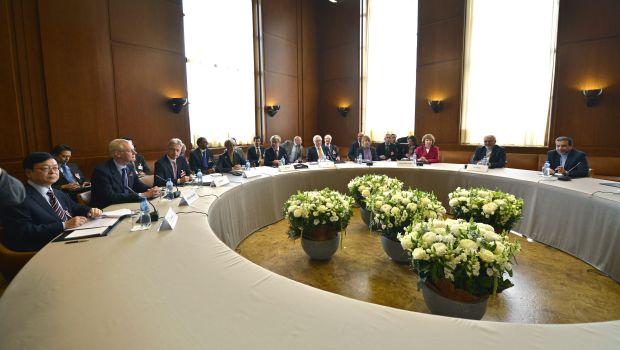
A general view shows participants before the start of two days of closed-door nuclear talks at the United Nations offices in Geneva Switzerland, Thursday, Nov. 7, 2013 (AP Photo/Keystone, Martial Trezzini)
The last round three weeks ago reached agreement on a framework of possible discussion points. The two sides kicked off Thursday’s round focused on getting to a “first step.” That is described by Western negotiators as an initial curb on uranium enrichment and other activities.
Tehran says it needs to do this work for peaceful purposes, but it also can be used to arm warheads with fissile material.
The initial encounter broke about an hour after it began, possibly to allow consideration of ideas presented by the two sides. European Union spokesman Michael Mann called it a “good opening session.”
The current two-day round follows negotiations three weeks ago that were described by both sides as promising, while falling short of advancing ether Iran’s or the six powers’ concrete demands.
Before the talks, Iranian Foreign Minister Mohammad Javad Zarif met with top EU diplomat Catherine Ashton, who is convening the meeting, in what Mann described as good discussions. He said the two agreed to meet again in the afternoon.
Asked afterward about the chances of agreement on initial steps this week, Zarif told reporters: “If everyone tries their best, we may have one.”
After nearly a decade of deadlock, Iran seems more amenable to making concessions to the six countries—the United States, Russia, China, Britain, France and Germany. New reformist President Hassan Rouhani has indicated he could cut back on the nuclear program in exchange for an easing of sanctions.
But factions both in Iran and in the United States are demanding their own interests be met first—and fast. Iranian hard-liners want significant sanctions reductions in exchange for scaling back enrichment, while some US lawmakers want the enrichment to stop altogether in exchange for loosening sanctions.
Officials from two of the delegations negotiating with the Iranians said the sanctions relief on offer will be limited and is unlikely to affect the core sanctions on Iran’s oil and finance sectors unless Tehran makes sweeping concessions, which it is unlikely to do at this meeting.
The negotiators might also test Iran’s commitment by waiting—possibly for as long as six months—after an agreement before applying sanctions relief. And the sanctions could be easily reapplied should Iran renege on commitments it makes in Geneva.
The officials demanded anonymity as the condition for discussing details of the closed negotiations.
